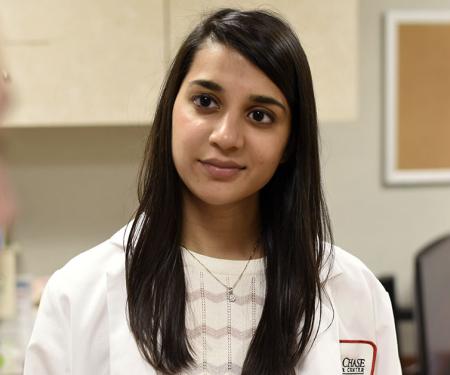Bone marrow transplants are sometimes a treatment option for patients with lymphoma. Typically, a bone marrow transplant may be needed if:
- Your body cannot make the blood cells it needs because your bone marrow or stem cells have failed
- Your bone marrow or blood cells have become diseased and need to be replaced with healthy cells
- Your lymphoma is being treated with high doses of chemotherapy and/or radiation treatment, which destroys both cancerous and healthy cells
When people hear the term “transplant,” they may think of an operation, but a bone marrow transplant is not a surgical process. Stem cells are given back to the body in the same manner as a blood transfusion. The cells are pushed into IV tubing, travel back to the marrow, and start to make a new population of healthy blood cells.
Through our highly ranked Bone Marrow Transplant Program, our transplant specialists provide bone marrow transplantation to improve long-term outcomes for patients with blood cancers. Our multidisciplinary program includes board-certified medical oncologists who are specially trained in bone marrow transplantation and have extensive experience in managing all types of transplants.
The type of transplant you receive is determined by several factors, including your diagnosis, stage of disease, overall health, and age. Most transplants for Hodgkin lymphoma and non-Hodgkin lymphoma are autologous or allogeneic:
Autologous Transplant
This transplant method involves using the patient’s own previously collected healthy cells. Autologous transplantation is often used to treat lymphoma patients whose disease relapses after initial therapy.
Allogeneic Transplant
For allogeneic transplants, the healthy cells come from matched related or unrelated donors. They are used to treat certain patients who have certain types of non-Hodgkin lymphoma and as a second option for lymphoma patients who don’t have success with an autologous transplant.
Which type of transplant a patient will receive is dependent upon a number of factors that your bone marrow transplant team will assess.
